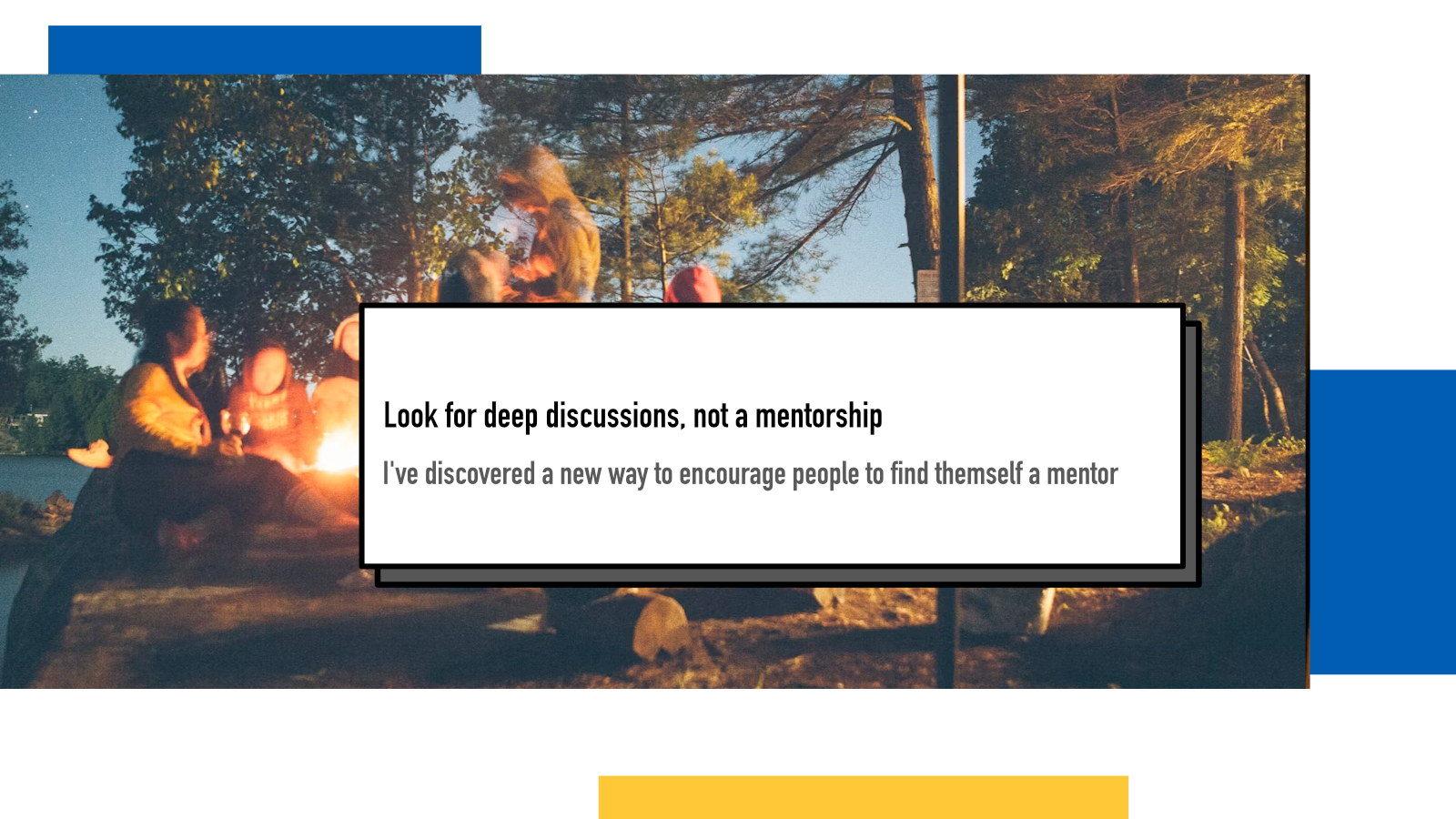Look for deep discussions, not a mentorship

I’m a big advocate for mentorships. I’ve been both a mentee and a mentor multiple times throughout my career and the good one have definitely shaped me into who I have become as a person and as a professional. I have also had experiences that were – if not bad, at least – mediocre and there’s been almost always one thing in common with all of them.
As I was listening to the first episode of Three Rules podcast and D’Avella and Holiday discussing what mentoring means to them and how to get into a mentorship relationship, I started thinking about mentoring for a few good days.
Both Ryan Holiday and Simon Sinek share the same story in these interviews: you don’t just walk to someone and ask them to be your mentor. Similarly than you wouldn’t walk to a stranger and ask if they’d wanna be your friend or get married to you. Mentorship is a relationship between two people and the most effective ones have in my experience too been the ones that form naturally.
That’s not to say that we can’t do anything to help form them. But making them formal and following a “mentorship program” has led me to bad experiences because there’s too much focus on the formal bits and “playing the role”.
Here’s my tip for software developers of any stage of their career who want to get into a relationship that creates the kind of value that mentorships do:
Start and participate in discussions about topics that interest you.
There are a lot of great people in local communities, blogosphere, social media, global conferences and the workplace who share a passion with you. Forget the notion of mentorships for a year and focus on getting involved in discussions about the subject topics.
If you read a great article about Rust’s memory safety, leave a genuine comment on their blog or send them an email where you continue the discussion. Be curious, be active and contribute to the discussion. Not just a “thanks for the great post” type of token message but think what you’d discuss if it was just you and your mate having a drink on Friday afternoon chatting about stuff that both of you are interested.
If you attend local meetups, go chat with the speakers after their talks. Every speaker I’ve met in events I organise or haven spoken in has been more than happy to dive into discussions about the topic they spoke about. They are passionate and interested in that topic, otherwise they probably wouldn’t have been on stage.
Write about the topics you care about in your own blog and share those in different platforms to initiate discussions. It may take a few years and many many posts even before people find your blog and get involved but at that point you’ve shown what you know about the topic and how you contribute and participate in the discussions.
Not every attempt will lead somewhere. Probably 90+% won’t end up in more than a quick back and forth if even that. But those ones that do, start off on the right foot and can lead to life-long relationships because you ended up in them through genuine discussions on shared interests.
I’ve been a mentor or a mentee as part of a program a few times. At a previous job, we ran a mentorship program which paired more experienced people with those newer in the industry. I’ve mentored students as part of their project courses at the university. Heck, I even ran my own mentoring program for a season.
Looking back at them now, I kinda regret my approach. I was too focused on the format and the formalities and what I expected mentoring should look like. Even with students who I knew from outside the course, the mentoring sessions ended up becoming rigid and awkward.
Instead, what I think I should have done is get the mentees to talk about whatever they are interested in. To spark up discussions and see where they lead. None of the formal ones led to any kind of “real” mentorship that would have lasted beyond the project or even between the scheduled mentoring sessions. So there was really nothing to lose if the other approach wouldn’t have worked out.
The best part of this approach is that even if the relationship don’t develop into something you’d call mentorship, you have likely met a new person, learned something new, shared some of your interest and participated in deep discussions.
I tend to look at things often on way too short perspective. I think about what we need to do to achieve some kind of meaningful outcome in few months or half a year or a full year. That’s way too short time in the grand scheme of things for something as profound as a great mentoring relationship.
Instead, I want to start looking at things on a 10-year or 20-year span. If we have all that time, what could we do and how we could lay a great foundation on things and then let things evolve into the direction they naturally do.
If something above resonated with you, let's start a discussion about it! Email me at juhamattisantala at gmail dot com and share your thoughts. This year, I want to have more deeper discussions with people from around the world and I'd love if you'd be part of that.